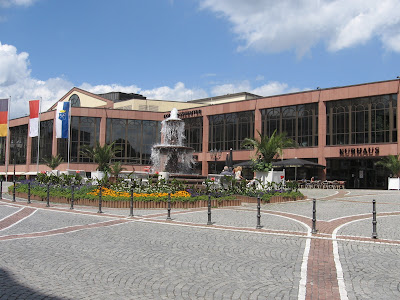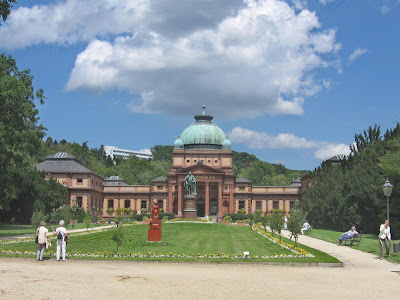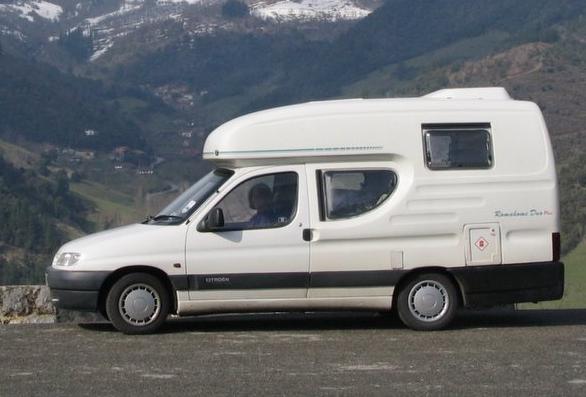This morning we visited the very pleasant town of Fulda, a place of 60,000 inhabitants. It has links with Devon which explains why we came. St. Boniface is the patron saint of the town where he spent much of his life and founded a Benedictine monastery. He was born in Crediton, Devon and educated in Exeter during the 7th century. He set out to convert the inhabitants of the Germanic area to Christianity and ended up being martyred in Friesland in 754 by being hacked about with an axe. To protect himself he held a copy of the Bible above his head. The actual book is preserved in the library in Fulda and our next mission should have been to find it. However, today is Saturday and we discovered that the library will not be open again until Monday. Our journey has not been wasted though and we have spent a really enjoyable day around the town. Boniface is buried in the crypt of the 18th century baroque cathedral so we have seen that, as well as the circular church of St. Michael, dating from the early ninth century where some lovely early wood carvings, probably dating from the 13th or 14th century can be seen. Unfortunately photography was not allowed, so no pictures.





Fulda seems a very religious town. There were services taking part in every one of its churches as we arrived so our visits were restricted. Most were baroque and quite honestly we wonder whether Boniface would have approved of so much wealth and grandeur. We have to admit though that they were magnificent buildings, white rendered inside to offset the extravagant gold decoration of the altars and side chapels.



Amongst the equally attractive secular buildings the baroque palace of the Prince Abbots is of particular note. We didn't see around inside but the gardens are lovely with statues, cherubs and several fountains sending magnificent water displays high into the air. Today the gardens were full of wedding couples with photographers recording their happy day. It is obviously the "In" place for newly weds and there were so many of them it has been impossible to completely exclude them from our photos! They will probably never know that they are on the internet!




Last year in Graz (Austria) we discovered a very nice fish restaurant (Nordsee) that is part of a chain that also has a branch in Fulda. So today we enjoyed a lunch that was vaguely like fish and chips with lemon and tartar sauce except it also had yogurt coated mixed salad and instead of chips we were served crunchy fried potatoes with bits of bacon in.
Around 3pm, having seen at least the main sights of Fulda we addressed the less agreeable task of navigating our way along the German motorways towards Bad Homburg. We felt we had a duty to visit this town as it is twinned with Exeter but it does mean we get sucked into the massive German conglomeration comprising the towns of Franfurt, Mainz, Wiesbaden, Offenbach and Hanau. We are now on a campsite where the only positive thing we can say about it is that there is a convenient train link into the centre of Frankfurt in one direction and Bad Homburg in the other. Jill has moaned and grumbled about the unpleasantness of coping with German motorways and weaving her way through countless sets of red traffic lights and urban sprawl while Ian has patiently coped by pouring out several glasses of the local Dornfelder Rheinhessen to pacify her. We've now decided to stop being disciplined about planning what we do tomorrow and watch a video instead.
Sunday 17th June 2007, Lorch an Rhein
We are now camped on a really wonderful site on the slopes of the Rhine Valley south of Koblenz. From Modestine we can look down over the steep vine-clad hillside to the river where long barges chug their way slowly upriver heavily laden with crates and containers. Along either side of the river runs the railway line carrying passengers on intercity trains or long freight trains pulling up to 50 trucks as they snake along the water's edge, winding their way around the base of the steep wooded slopes of the far bank of the river.
We have done an enormous amount today and things have not turned out at all how we expected. We woke early and by 9am we were in the centre of Frankfurt having bought an all day freedom ticket to the entire Frankfurt transport system. We can now officially announce that the dullest place in all of Europe is Frankfurt city centre on a Sunday morning. The silence of the city was eerie as we came up from the scruffy underground station to emerge into Willy Brand Platz dominated by the massive glass tower blocks of the European Central Bank, the Main Tower and several other multinational financial institutions. At first it was exciting. We walked through the empty streets expecting always to find the throbbing pulse of the city. However, we quickly realised that this was all there was. Frankfurt was virtually destroyed during the Second World War and has been rebuilt as Germany's main financial city. Monday to Friday the place may well be a centre of frenzied activity but at the weekend everyone spills out of the city until Monday morning.

It did mean we could see in comfort the exteriors of those few buildings of major importance. We soon found The Old Opera House and the Stock Exchange. Both are impressive buildings but have been largely reconstructed after the war. So too has the Old Rathaus with its stepped gables and most of the other buildings that surround the Römer as the main square is known. Nearby is the impressive gothic Kaiserdom where from 1562 until 1806 the Holy Roman Emperors were crowned. It, and most of the buildings surrounding it, were almost razed during the war. Generally, even if things look old they most probably are not. However, we had to remind ourselves that the reason Frankfurt is such a boring place is because we bombed everything it had.





We eventually found Goethe's birthplace but it was closed and swathed in scaffolding with large crowds of happy Jappy chappies having their photos taken in front of it. We did discover a red sandstone figure of Charlemagne, who is reputed to have founded the city of Frankfurt in the eighth century. We also found the huge Paulskirche, built between 1790 and 1833, also heavily restored after the war. It was here that the first German National Assembly was held in 1848 and President Kennedy spoke there on his visit in 1963. (Whether he adapted his famous Berlin statement to say "Ich bin ein Frankfurter" we do not know.)



We crossed the River Main by an iron footbridge from where we watched the national dragon boat racing championships. This was the best fun of the morning with teams from all over Germany participating. We bought a plate of chips and mayonnaise and joined others on the far bank to cheer them all on. There was a lovely atmosphere. From the other side of the River Main the huge towers of the various financial organisations dominate the skyline. Not for nothing is Frankfurt on Main nicknamed Mainhatten!


We walked back through the deserted but excellent shopping malls to the Stock Exchange, the financial heart of Germany. Outside were a brass bull and a brass bear, representing the rises and falls in share prices.

We felt generally rather disappointed with Frankfurt and disinclined to spend the rest of the day walking around in a ghost town. We took the train back to the campsite, gave our transport tickets to some newly arrived campers as they are valid all day, packed up and drove north to see Exeter's twin town Bad Homburg.
This is a pleasant spa town with a small historic quarter of half-timbered houses and a mediaeval castle surrounded by beautiful gardens. There was far more life in Bad Homburg than we had found in Frankfurt and we spent a pleasant couple of hours exploring the town. Exeter Weg was a long way out, probably on a trading estate if they are as enthusiastic about twinning as Exeter is, so we gave it a miss. Outside the entrance to the Kurhalle we discovered an English phone box given as a twinning gift by Exeter in the 1990s. It was in working order – which it almost certainly was not when it was located in Exeter High Street. As we used it to phone home we wondered whether we'd ever been in it before!






After several abortive attempts to leave the town and a couple of diversions that sent us round in circles for a while, we eventually succeeded in leaving the large, urban conurbation behind and headed across country towards the Rhine. The route eventually turned out to be very pleasant taking us along winding roads through the Taunus region of steep, wooded hills and deep valleys. We had to be very controlled not to divert to Katzenelnbogen (cat's elbow) when we saw it signposted and reached Lorch still singing a silly song from our childhood with the chorus line "In Gillygillyochsenpfefferkatzenelnbogen by the Sea". (Don't worry about it if you are not from our generation.) We'd never realised such a place actually existed!
The campsite we were seeking turned out to be several kilometres up the Rhine from Lorch. Instead of following beside the river we were directed up a steep narrow route used by growers attending their vines. This gave us wonderful views down onto the river. It was still warm and sunny when we arrived so we were able to sit overlooking the vines as we drank chilled white Thuringian wine, a greatly appreciated present from our friend Hubert. Tomorrow we will buy some wine from the banks of the Rhine before we move on from here. It is now 11pm and the rain has started again. Temperatures have become so much more comfortable over the last few days.

